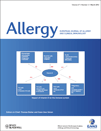Prenatal allergen exposures prevent allergen-induced sensitization and airway inflammation in young mice
Edited by: Angela Haczku
Abstract
Background:
Immune-modulation such as tolerance induction appears to be an upcoming concept to prevent development of atopic diseases. Pregnancy might present a critical period for preventing allergic sensitization of the progeny. We investigated the effect of maternal allergen exposures during pregnancy on allergen-induced sensitization and airway inflammation in the offspring in a murine model.
Methods:
BALB/c mice were exposed to aerosolized ovalbumin (OVA) three times per week from day 7 of pregnancy until delivery (day 0). Offspring were systemically sensitized by six intraperitoneal injections with OVA between postnatal days 21 and 35, prior to airway allergen challenges on days 48, 49, and 50. Analyses were performed on day 52. To examine long-lasting effects of maternal OVA exposures some offspring were sensitized between days 115 and 129; analyses took place on day 147.
Results:
Compared to maternal placebo exposures, maternal OVA exposures suppressed OVA-specific IgE serum levels and inhibited development of allergen-induced airway inflammation in the OVA-sensitized offspring on both days 52 and 147. This protective effect was associated with a shift from a predominant Th2 immune response toward a predominant production of the cytokines IFN-γ and IL-10. Further, maternal OVA exposures were associated with development of CD25+Foxp3+ regulatory T cells (Tregs) in the OVA-sensitized offspring. Depletion of Tregs or neutralization of IL-10 prior to allergen sensitization re-established OVA-induced sensitization and eosinophilic airway inflammation in the OVA-sensitized offspring.
Conclusions:
In our model, maternal allergen exposures during pregnancy prevented later allergen-mediated sensitization and airway inflammation by allergen-specific tolerance induction in the offspring.




